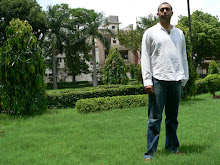Been out of station in Sri Lanka, seeing the mockery of elections they call polls in the east of the country unfold, and then following the equally depressing drama of a mother struggle to get the police to investigate the patently obvious murder of her teenage daughter on a Goa beach.
Sri Lanka’s eastern coast is both beautiful and brutal. Death and murder hangs in the air, much like the shimmering heat that makes the place unbearable. The war over the territory has disappeared only for a reign of terror carried out by thugs, armed with weapons and attitude. Everyone is dirty. The police, the army, the officials, the would-be politicos, the rebels, the breakaway rebels. Filled with cruelty, Sri Lanka’s civil war is turning into a meaningless disaster. No winner, just buckets of blood split in the quest to impose democracy on a people who had gone to war for democratic rights.
For Scarlett Keeling and her mother Fiona MacKeown, the story is one of naivety. Fiona’s credulity for believing anyone would care if her teenage daughter dabbled in drugs and sex while she was missing from Planet Parent. Scarlett’s life was later lost in the beach spray of murder.
Worst is the Indian media’s haughty cynicism. Where were the reporters for two weeks while the mother went begging for someone to listen to her story? It took London’s Mail on Sunday to publish her distraught cries for help. And then a phalanx of Fleet St’s finest to turn up and basically expose the local drug tourism that passes for holidays in Anjuna beach.
I got into an argument with a local television reporter who turned up at the office to interview me over the Keeling case, because her private view was that Scarlett was obviously asking for it. When I got angry, the woman reporter said she’d been racially abused in England and nothing had happened. Words versus sticks and stones, I thought.
Maybe I am the naïve one. I must be stupid to believe that the world is fair. That crimes must be seen for what they are. That lives shouldn’t be lost cheaply. That when they are, someone has to pay. I don’t think these are just morally convenient notions of justice. Sure it’s hard to sift the wicked from the good. But not to bother, as in Sri Lanka and Goa, leaves it impossible for people to believe in possibility of justice. Rather humankind would be left, as I was, with the awful realisation that the world remains indifferent or even hostile to their plight.
Subscribe to:
Post Comments (Atom)

No comments:
Post a Comment